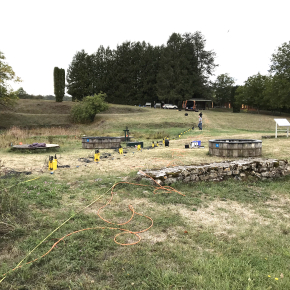Fixed-term contract
Project manager for the evaluation and visualisation of the quality of results from the ORCHIDEE numerical code of the continental biosphere, in the field of Climate Sciences.
Contexte
Sorbonne University (http://sciences.sorbonne-universite.fr) is a multidisciplinary, research-intensive university. Continuing the Sorbonne’s humanist tradition, it strives to meet the scientific challenges of the 21st century and to pass on the knowledge generated by its laboratories and research teams to its students and society as a whole.
It provides training for 54,000 students, including 4,700 doctoral students and 10,200 international students, and employs 6,300 teachers, lecturers, researchers and 4,900 library, administrative, technical, social and health staff. Its budget is €670m.
Sorbonne University, which is mainly located in the heart of Paris, has first-rate potential and extends its presence to more than twenty sites in the Ile-de-France region and beyond.
Sorbonne University has an original organisation with three faculties – Arts, Medicine and Science and Engineering – which have considerable autonomy to implement the university’s strategy within their own boundaries on the basis of a contract of objectives and resources. University governance focuses on promoting the university’s strategy, steering its activities, developing partnerships and diversifying its resources.
Within Sorbonne University, the Faculty of Science and Engineering covers a wide range of scientific disciplines.
It comprises 79 research laboratories, 22 training departments and 6 UFR (Unité de Formation et de Recherche) in chemistry, engineering, mathematics, physics, life sciences and Earth, Environment and Biodiversity. It also includes the École Polytechnique universitaire – Polytech Sorbonne -, the Institut d’Astrophysique de Paris, the Institut Henri Poincaré, and three marine stations located in Banyuls-sur-Mer, Roscoff and Villefranche-sur-Mer, the latter three having, with the ECCE-TERRA structure, the status of observatories for the sciences of the Universe.
It is home to 20,800 students, including 2,700 PhD students, and has 4,800 staff – teachers, lecturers, researchers and 3,252 administrative or technical staff.
Description
Mission
Development and deployment of a software tool based on statistical methods capable of evaluating and visualising the quality of the results of the IPSL’s ORCHIDEE numerical code of the continental biosphere, in the field of Climate Sciences.
Context
The work will be carried out at the Institut Pierre Simon Laplace (IPSL, https://www.ipsl.fr/), on the Pierre and Marie Curie campus of Sorbonne University (Paris 5e), as part of the « evaluation » working group for the ORCHIDEE continental surface process model (https ://orchidee.ipsl.fr/). The aim of this working group is to develop, in conjunction with the other components of the numerical model of the IPSL system (https://cmc.ipsl.fr/), evaluation tools for the ORCHIDEE model that will provide better guidance for current and future developments. The person hired will also be in contact with the ORCHIDEE project group, which coordinates all the developments of this model and brings together engineers and researchers (15 to 20 people) from several IPSL laboratories as well as other laboratories in France.
The collective work on the ORCHIDEE model is punctuated by weekly meetings of the project group, in which the candidate will participate.
The developments carried out as part of the ‘evaluation’ working group are coordinated by Patricia Cadule (, who will be the main coordinator and will ensure that weekly working meetings are held), Philippe Peylin () and Bertrand Guenet ().
This post is available in the Faculty of Science and Engineering – http://sciences.sorbonne-universite.fr
Compétences requises
Main activities
- Contribution with the ORCHIDEE project group to the identification of relevant variables for understanding the general behaviour of the ORCHIDEE model (compared with other numerical models or observational data). It should be noted that observational data have already been collected and re-calibrated by the evaluation working group.
- Specification and construction of « metrics » based on statistical methods in order to define the behaviour of the ORCHIDEE model in relation to observations and simulations carried out with other surface process models.
- Definition of specifications and construction of a set of visualisation tools adapted to the different variables and ‘metrics’ selected and providing spatialised diagnostics (maps) and temporal evolution (time series). This set of tools will be able to take advantage of existing tools (Mapper, Climaf, ESMvalTool, iLAMB, etc.) developed internally at IPSL or by the international community.
- Definition of specifications and construction of a tool providing an overview of the ‘performance’ of a version of the ORCHIDEE model compared with other versions and/or other models (such as iLAMB).
- The design of the tools must enable a large volume of data to be processed (different data formats, data with different geographical coverage, set of simulations from inter-comparisons such as the CMIP exercise) in order to be able to compare all ORCHIDEE variables with other sets of models / existing data.
- Control of the software infrastructure enabling simulations to be carried out with the ORCHIDEE model (in different configurations from local to global scales), on the IPSL and LSCE mesocomputing centres and the CNRS and CEA supercomputers.
- Participation in the exploitation of simulations carried out with ORCHIDEE.
Other activities
- Participating in the ORCHIDEE model parameter calibration working group.
- Participating in the collective development and dissemination of the ORCHIDEE model
- Participate in the development of the IPSL Earth system model, which will be used to carry out simulations for the next Coupled Model Intercomparison Project (CMIP, https://www.wcrp-climate.org/wgcm-cmip).
Knowledge
- Numerical and statistical modelling
- Management of large volumes of data
- Software development (shell, unix/linux)
- Programming languages (python, fortran)
- High-Performance Computing (MPI, OpenMP, Dask)
- Code management cycle
- Data processing and visualisation:
* Python
* NCO, CDO and GDAL tools.
* NetCDF, TIF, SHP, GRIB, CSV, JSON and GeoJSON data formats.
* Pandas, GeoPandas, Xarray and Numpy libraries.
* Matplotlib, Cartopy and Folium libraries
* Leaflet, Mapbox and Kepler.gl mapping tool.
* D3.js
Cross-disciplinary knowledge required
Knowledge of environmental sciences would be appreciated.
Skills
- Coordinate developments
- Implement a quality approach
- Draft documents in technical English
- Support and advise
- Team spirit
- Written and oral communication
- Keeping a technical and scientific watch
Personal skills
- Autonomy
- Scientific and technical rigour
- Availability
- Ability to listen
- Team spirit
- Curiosity






